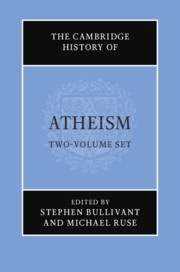Book contents
- The Cambridge History of Atheism
- The Cambridge History of Atheism
- Copyright page
- Dedication
- Contents
- Acknowledgments
- Contributors
- Introduction
- Part I Preliminaries
- Part II Atheisms in History
- Part III Reformation, Renaissance, Enlightenment
- Part IV Classical Modernity: Philosophical and Scientific Currents
- Part V Classical Modernity: Social and Political Currents
- 23 The French Revolution
- 24 Freethinkers, Atheists, and Anticlericals: Spanish American Struggles for Independence
- 25 Marx and Marxisms
- 26 Nineteenth-Century Russia
- 27 Secularism and Humanism
- 28 Bertrand Russell
- 29 Robert Ingersoll
- 30 Early Women’s Movement
- 31 Early African American Secularism
- Part VI Twentieth and Twenty-First Centuries: Intellectual and Artistic Currents
- Part VII Lived Atheism in the Twentieth- and Twenty-First Centuries: Case-Studies
- Part VIII Emerging Atheisms in the Twenty-First Century
- Part IX Conclusion
- Index
- References
29 - Robert Ingersoll
from Part V - Classical Modernity: Social and Political Currents
Published online by Cambridge University Press: 25 September 2021
- The Cambridge History of Atheism
- The Cambridge History of Atheism
- Copyright page
- Dedication
- Contents
- Acknowledgments
- Contributors
- Introduction
- Part I Preliminaries
- Part II Atheisms in History
- Part III Reformation, Renaissance, Enlightenment
- Part IV Classical Modernity: Philosophical and Scientific Currents
- Part V Classical Modernity: Social and Political Currents
- 23 The French Revolution
- 24 Freethinkers, Atheists, and Anticlericals: Spanish American Struggles for Independence
- 25 Marx and Marxisms
- 26 Nineteenth-Century Russia
- 27 Secularism and Humanism
- 28 Bertrand Russell
- 29 Robert Ingersoll
- 30 Early Women’s Movement
- 31 Early African American Secularism
- Part VI Twentieth and Twenty-First Centuries: Intellectual and Artistic Currents
- Part VII Lived Atheism in the Twentieth- and Twenty-First Centuries: Case-Studies
- Part VIII Emerging Atheisms in the Twenty-First Century
- Part IX Conclusion
- Index
- References
Summary
Commentators in the nation’s newspapers foresaw impending doom. In the United States, as well as across the Atlantic, a frightening intellectual movement was gaining steam in the final decades of the nineteenth century. The movement supposedly portended the end of Christianity, morality, and civil society. Writing in the Chicago Tribune (1870), one commentator chided the “moral weakness” of the movement, which embraced “mere facts without faiths or fancies, mere knowledge without affection of imagination, and mere science without worship or inspiration.” In 1877, a commentator for the Weekly Tribune in Manitowoc, Wisconsin, saw in the movement a “bigotry” and “hostility” to life that revealed its hollow core. In 1889, the Pittsburgh Dispatch quoted the Archbishop of New York on the dreadful danger of this movement: “What will human life be in this world? What will become of the family? What of civil society itself?”
- Type
- Chapter
- Information
- The Cambridge History of Atheism , pp. 531 - 549Publisher: Cambridge University PressPrint publication year: 2021



